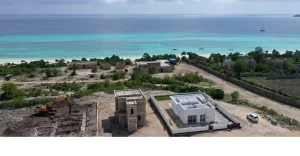The U.S. Embassy in Tanzania was forced to close its doors to the public for two days due to a widespread internet outage affecting several East African countries, reports BBC News.
The embassy announced the closure via X (formerly known as Twitter) on Monday, citing “degraded network service nationwide”. All consular appointments scheduled for Tuesday and Wednesday are cancelled and will be rescheduled for a later date. However, the embassy will remain operational for emergencies involving American citizens and for visa pickups.
The internet disruption began on Sunday morning and caused significant connectivity issues in Tanzania, Kenya, Rwanda, and Uganda. According to internet monitoring group NetBlocks, Tanzania is the most severely impacted country.
Industry experts believe the outage stems from faults in the undersea cables that connect the region to the global network via South Africa. Some East African internet users were still experiencing slow speeds, with telecom providers indicating ongoing efforts to fully restore service.
Source: allafrica.com














